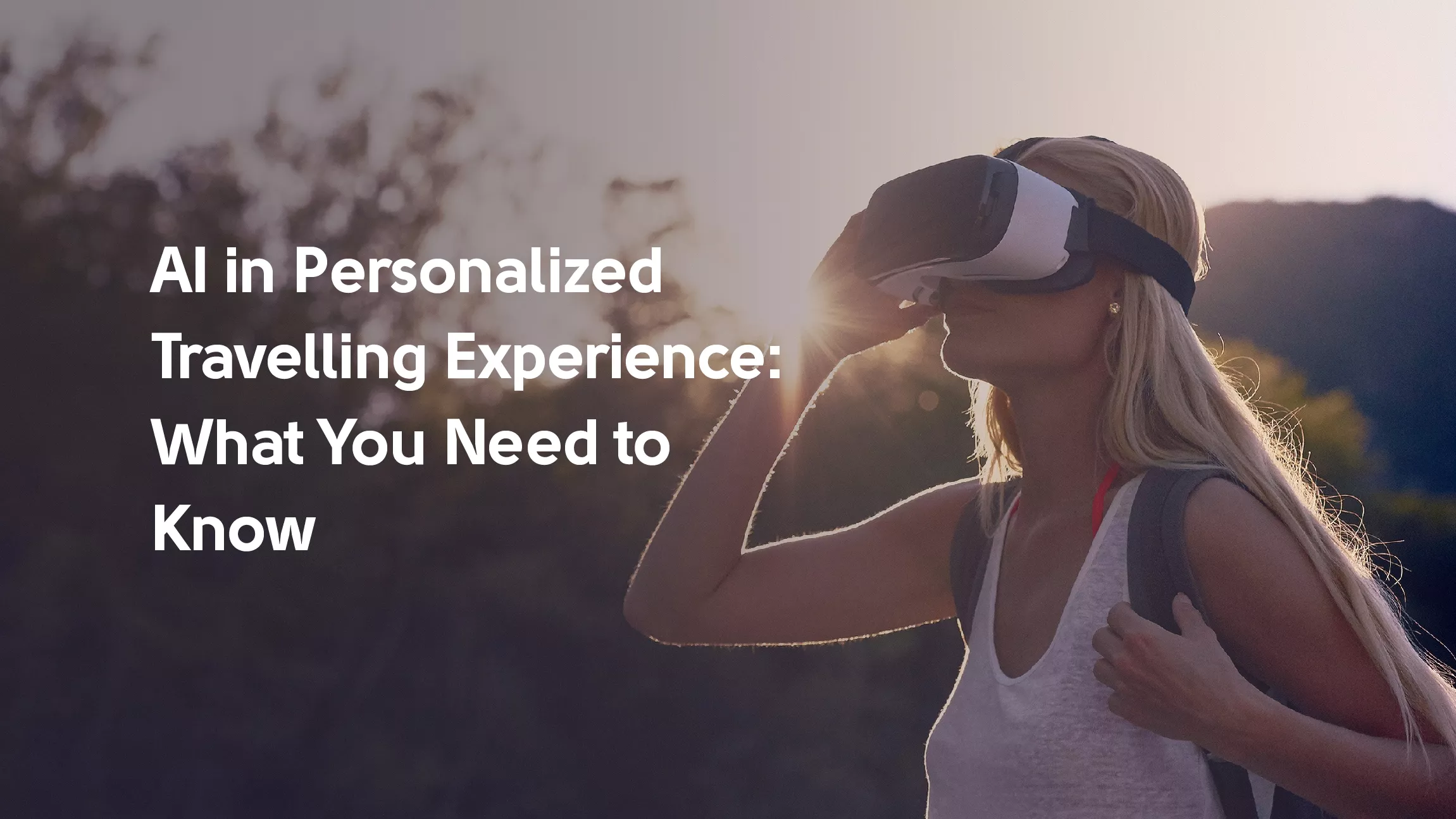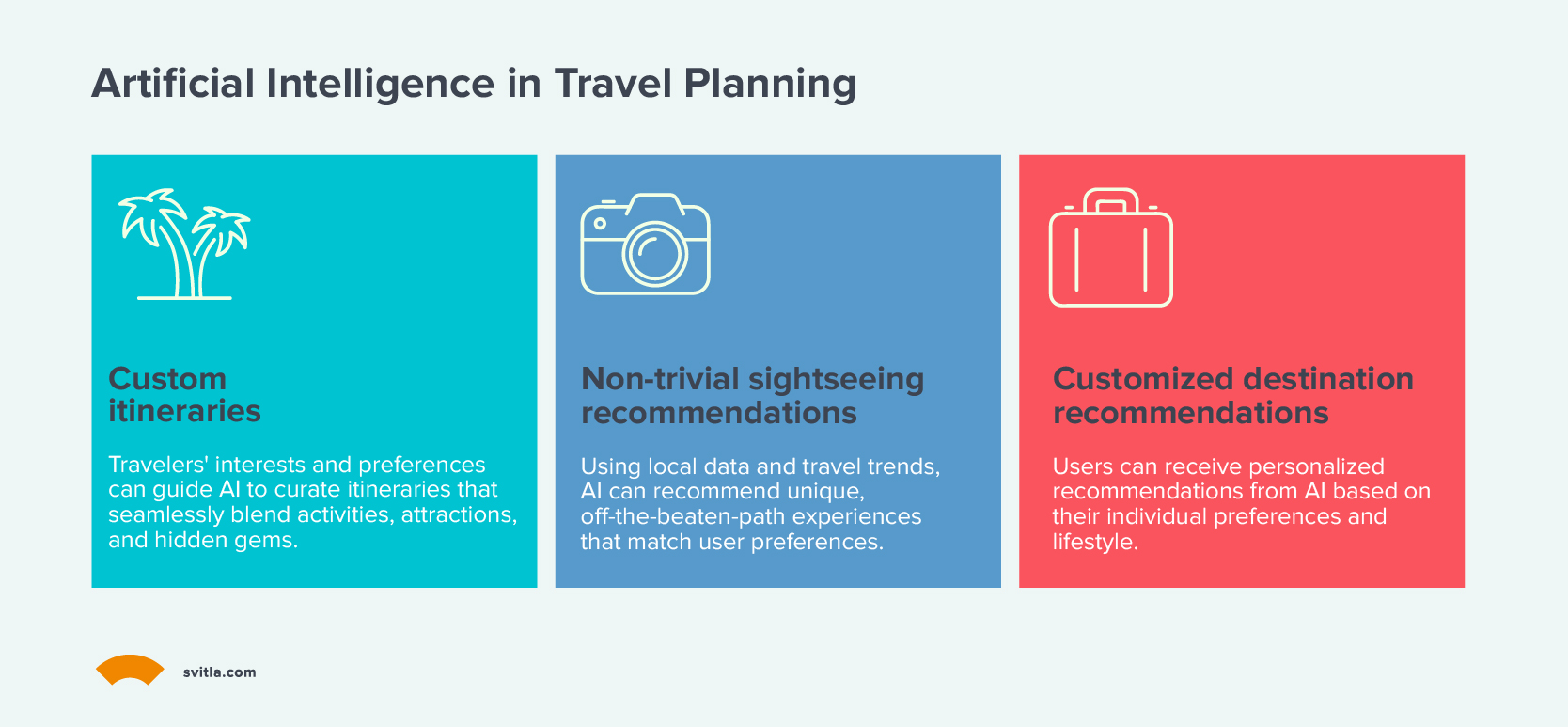
AI Use Cases in Personalized Traveling Recommendations
One-size-fits-all itineraries are a thing of the past, especially with travelers’ expectations that continue to evolve and search for new, more engaging interactions.
We’re lucky to witness this shift, a modern era where travelers not only crave personalized experiences but demand a unique tailoring approach that incorporates their interests, needs, and preferences. In fact, 83% of travelers value personalized suggestions and deals from online travel agencies tailored to their preferences and previous reservations. This shift in demand puts significant pressure on the hospitality and travel industry to embrace and adopt innovative solutions that boost the customer journey and take it to new levels.
Artificial intelligence (AI), Generative AI, and Machine Learning are all emerging as powerful tools in this realm, allowing businesses to personalize travel recommendations in ways never before possible.
This article delves into the exciting potential of AI in the world of personalized travel. We'll explore various use cases showcasing how AI can leverage data and user behavior to curate recommendations that resonate with each traveler, ultimately leading to a more fulfilling and memorable travel experience.
AI in Travel Planning: Crafting an Itinerary
Creating tailor-made travel plans would be a good place to begin if we're talking about exciting horizons in AI for travel. From the moment users plan their escape to the final booking details, the process can be fraught with decisions and uncertainties. However, the advent of AI in travel planning is turning this daunting task into an exciting and personalized adventure.
AI becomes the travel companion that knows traveler’s likes and dislikes. AI is powerful enough to process and analyze massive amounts of data, including:
- Travel history and preferences (past destinations, activities, travel style, budget)
- Demographic information (age, interests, cultural background)
- Social media activity (travel posts, liked pages, expressed interests)
- Real-time travel data (weather forecasts, event listings, transportation options)
AI crafts personalized itineraries and destination recommendations that go beyond generic lists. Here's how:
- Generating custom itineraries: AI curates itineraries that seamlessly blend desired activities and attractions based on travelers' interests and preferences.
- Recommending off-the-beaten-path experiences: By analyzing user preferences alongside broader travel trends and local data, AI can recommend unique experiences that perfectly align with individual interests.
- Suggesting destinations based on individual preferences: AI analyzes data to recommend destinations that cater to specific needs or wants.

Whether a user is an art enthusiast or an adrenaline junkie, AI platforms can pinpoint attractions and activities that align perfectly with their interests. These itineraries consider local events, historical weather patterns, and even the best travel routes, ensuring every trip aspect is optimized for an unforgettable experience.
The power of AI also extends to the logistics of travel planning, removing the usual stress associated with finding the best flight deals and accommodations. By analyzing massive amounts of data, AI tools can predict price trends, helping users book at the most reasonable time to save money. They can even match users with accommodations that fit their budget, style, and preferences, whether staying in the city's heart or a secluded retreat.
Furthermore, AI-driven platforms are making it easier to adapt and comply with travel regulations and requirements. From visa information to health guidelines, AI tools provide up-to-date information.
Personalized Accommodation and Experiences: Beyond Just a Place to Stay
The hunt for the perfect accommodation is much more than ticking a box on a traveler’s checklist. It's about finding a space that feels special. Algorithms sift through past preferences, the tone of online reviews, and even Pinterest boards, to present travelers with tailor-made options.
AI doesn't just randomly select experiences; it learns with every choice travelers make, every review they leave, and every photo they share. This continuous learning process means the recommendations get more precise and attuned to evolving interests over time.
AI's impact on travel extends to personalized recommendations across various aspects of the travel experience, including:
- Accommodation. AI can analyze user preferences like budget, desired amenities, and travel style alongside hotel location, facilities, and reviews to recommend accommodations that truly fit.
- Local sightseeing. AI delves into user interests and combines them with local data to suggest unique sightseeing experiences beyond typical tourist attractions.
- Gastronomic experiences. AI enables curating personalized dining recommendations by analyzing food preferences (dietary restrictions, culinary interests) and leveraging local data to recommend restaurants that cater to individual tastes.
Additionally, AI can personalize recommendations for:
- Events and activities: Suggesting concerts, festivals, and workshops based on user preferences.
- Transportation: Recommending the most convenient and efficient travel options based on itinerary and preferences.
- Shopping: Identifying local markets and shops aligned with individual interests.
Streamlining Logistics with AI: Smoother Journeys Ahead
The complexity of coordinating flights, ground transportation, and ensuring timely arrivals can be overwhelming. AI shines by offering predictive analytics to optimize travel schedules, going beyond mere suggestions and taking into account real-time data for more efficient travel routes. Moreover, recent studies find that 64% of consumers and 80% of business purchasers expect companies to provide immediate replies and interactions. This logistical precision ensures that travelers enjoy more of their vacation time without fretting over the possibility of missed connections or unexpected delays.
Overall, AI plays a crucial role in streamlining the logistics of travel. This includes:
- Recommending the most suitable and efficient travel options: AI can analyze factors like budget, travel time, preferences (direct flights vs. layovers), and real-time data (traffic conditions, flight availability) to recommend the ideal mode of transportation for each leg of the journey. Imagine a traveler with a tight budget and limited time being directed towards budget-friendly airlines with efficient connections. At the same time, a family with young children might be suggested a specific flight offering entertainment options onboard.
- Optimizing route planning: AI can analyze real-time traffic conditions, weather forecasts, and individual preferences (scenic routes vs. fastest routes) to plan the most efficient and enjoyable routes for car rentals, public transportation, or personal driving. This ensures travelers arrive at their destinations on time while potentially avoiding traffic jams or navigating unfamiliar roads with ease.
But AI’s logistical prowess doesn’t stop at planning and preparation. For instance, AI-powered concierge services can adjust itineraries on the fly, suggesting alternative activities or dining options if unexpected closures or changes occur. Additionally, AI can assist with:
- Luggage management: Recommending luggage storage options or facilitating contactless check-in at airports.
- Visa and document management: Providing reminders and assisting with the application process for relevant travel documentation.
- Vaccination and health considerations: AI platforms aggregate data from various sources to provide accurate, location-specific information on everything from vaccination policies to important health outbreaks.
- Language barriers: Once a significant challenge for international travelers, language barriers become a thing of the past with AI-driven translation apps that offer real-time interpretation services.
- Currency exchange: Recommending reputable exchange services and providing up-to-date exchange rates.
By mitigating logistical hurdles, AI empowers travelers to focus on enjoying their journey, knowing that the details are handled efficiently. This allows for a more relaxed and stress-free travel experience from start to finish.
Curating Entertainment and Activities: a Travel Concierge
With AI, exploring local entertainment becomes a breeze. AI-based systems sift through a plethora of options to give travelers a list of curated events tailored to their tastes. Of course, these recommendations won’t be random; they will be selected based on specific interests, past experiences, and even sentiments expressed on social media.
Travel looks different for everyone. Some travelers travel for sightseeing or to experience new cultures, while others focus on relaxation spots to enjoy leisure activities. AI assists travelers in finding personalized entertainment options that cater to these individual preferences.
Here's how AI can personalize entertainment recommendations:
- Recommending events and activities: Based on user interests (music genres, preferred activities, past entertainment choices), AI can suggest concerts, festivals, workshops, or shows that align perfectly with individual tastes.
- Curating personalized playlists and movie recommendations: By analyzing user preferences (music genres, preferred streaming services, movie genres), AI can suggest personalized playlists and movie recommendations to enjoy during travel downtime.
- Suggesting unique local experiences: A recent poll indicates that 63% of travelers are inclined to make reservations via online travel agencies that provide distinctive experiences, such as local cultural events, culinary tours, or adventurous outings. AI can delve deeper, analyzing local event calendars and user interests to recommend unique, off-the-beaten-path entertainment options.
The main difference between AI and traditional travel planning is AI’s dynamic adaptability. Let’s imagine a scenario where a sudden rainstorm dampens the outdoor plans of a family traveling to Oregon. AI can suggest alternative indoor activities in real-time, ensuring an uninterrupted experience regardless of weather conditions. This level of responsiveness and personal attention makes AI in travel so transformative.
Whether it's securing tickets to a sold-out show or a local festival that perfectly aligns with traveler’s interests, AI makes it possible to enrich travel experiences with moments that resonate with travelers' needs.
The Future of Personalized Travel with AI
The potential of AI in personalized travel recommendations is vast and ever-evolving. As AI continues to develop and disrupt, we can expect even more innovative and sophisticated solutions that cater to every traveler's unique needs and desires.
By leveraging AI-powered solutions, companies can offer more engaging and personalized experiences, ultimately increasing customer loyalty, brand reputation, and revenue.
Svitla Systems is your trusted ally in optimizing and modernizing your hospitality applications. We integrate cutting-edge AI solutions into your existing infrastructure, enabling you to:
- Craft personalized recommendations across various aspects of the travel journey, including itineraries, accommodation, and activities.
- Streamline logistics and optimize operations through AI-powered tools.
- Enhance guest engagement by providing a more personalized and interactive experience.
Ready to unlock AI's potential and create a truly differentiated travel experience for your guests? Contact Svitla Systems today, and let's embark on this exciting journey together.
Let's discuss your project
We look forward to learning more and consulting you about your product idea or helping you find the right solution for an existing project.
Your message is received. Svitla's sales manager of your region will contact you to discuss how we could be helpful.



